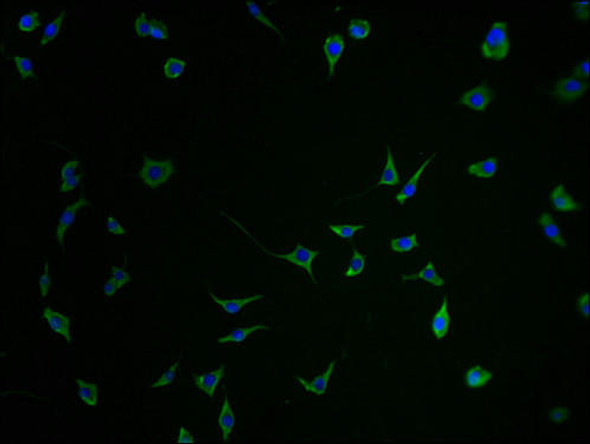Description
MAGEA2 Antibody (PACO18185)
The MAGEA2 Monoclonal Antibody (PAC018185) is a valuable tool for researchers studying MAGEA2, a member of the MAGE gene family that is involved in cancer progression and immune evasion. This antibody, produced using hybridoma technology, specifically recognizes MAGEA2 in human samples and is validated for use in various applications such as immunohistochemistry and flow cytometry.MAGEA2 is known to play a role in tumorigenesis and is often overexpressed in various cancer types, making it a potential target for cancer therapy.
By targeting MAGEA2, researchers can gain insight into its function and potential as a therapeutic target in cancer treatment. Additionally, understanding the role of MAGEA2 in immune evasion can lead to the development of novel immunotherapies for cancer patients.Overall, the MAGEA2 Monoclonal Antibody is a valuable tool for researchers investigating the role of MAGEA2 in cancer progression and immune evasion. Its specificity and versatility make it a reliable choice for studies in oncology and immunology.
| Antibody Name: | MAGEA2 Antibody (PACO18185) |
| Antibody SKU: | PACO18185 |
| Size: | 50ul |
| Host Species: | Rabbit |
| Tested Applications: | ELISA, WB |
| Recommended Dilutions: | ELISA:1:2000-1:10000, WB:1:1000-1:5000 |
| Species Reactivity: | Human, Mouse |
| Immunogen: | Synthetic peptide of human MAGEA2 |
| Form: | Liquid |
| Storage Buffer: | -20°C, pH7.4 PBS, 0.05% NaN3, 40% Glycerol |
| Purification Method: | Antigen affinity purification |
| Clonality: | Polyclonal |
| Isotype: | IgG |
| Conjugate: | Non-conjugated |
 | Gel: 10%SDS-PAGE, Lysate: 40 μg, Lane: Mouse heart tissue, Primary antibody: PACO18185(MAGEA2 Antibody) at dilution 1/2100, Secondary antibody: Goat anti rabbit IgG at 1/8000 dilution, Exposure time: 20 seconds. |
| Background: | This gene is a member of the MAGEA gene family. The members of this family encode proteins with 50 to 80% sequence identity to each other. The promoters and first exons of the MAGEA genes show considerable variability, suggesting that the existence of this gene family enables the same function to be expressed under different transcriptional controls. The MAGEA genes are clustered at chromosomal location Xq28. They have been implicated in some hereditary disorders, such as dyskeratosis congenita. This gene has two identical copies at different loci. Alternatively spliced transcript variants encoding the same protein have been identified for this gene. |
| Synonyms: | melanoma antigen family A, 2 |
| UniProt Protein Function: | MAGE-A2: Reduces p53/TP53 transactivation function through recruitment of HDAC3 to p53/TP53 transcription sites. Also represses p73/TP73 activity. Proposed to enhance ubiquitin ligase activity of RING-type zinc finger-containing E3 ubiquitin-protein ligases. In vitro enhances ubiquitin ligase activity of TRIM28 and stimulates p53/TP53 ubiquitination by TRIM28 potentially in presence of Ubl-conjugating enzyme UBE2H. Proposed to act through recruitment and/or stabilization of the Ubl-conjugating enzyme (E2) at the E3:substrate complex. May play a role in embryonal development and tumor transformation or aspects of tumor progression. In vitro promotes cell viability in melanoma cell lines. Antigen recognized on a melanoma by autologous cytolytic T- lymphocytes. |
| UniProt Protein Details: | Protein type:Cancer Testis Antigen (CTA) Chromosomal Location of Human Ortholog: Xq28 Cellular Component: PML body; nucleus Molecular Function:protein binding; histone deacetylase binding; ubiquitin protein ligase binding Biological Process: transcription, DNA-dependent; cellular protein catabolic process; positive regulation of ubiquitin-protein ligase activity; negative regulation of transcription from RNA polymerase II promoter; negative regulation of protein sumoylation |
| NCBI Summary: | This gene is a member of the MAGEA gene family. The members of this family encode proteins with 50 to 80% sequence identity to each other. The promoters and first exons of the MAGEA genes show considerable variability, suggesting that the existence of this gene family enables the same function to be expressed under different transcriptional controls. The MAGEA genes are clustered at chromosomal location Xq28. They have been implicated in some hereditary disorders, such as dyskeratosis congenita. This gene has two identical copies at different loci. [provided by RefSeq, Jul 2008] |
| UniProt Code: | P43356 |
| NCBI GenInfo Identifier: | 1170856 |
| NCBI Gene ID: | 266740 |
| NCBI Accession: | P43356.1 |
| UniProt Secondary Accession: | P43356,Q32NC6, A8K328, |
| UniProt Related Accession: | P43356 |
| Molecular Weight: | 314 |
| NCBI Full Name: | Melanoma-associated antigen 2 |
| NCBI Synonym Full Names: | melanoma antigen family A, 2B |
| NCBI Official Symbol: | MAGEA2B |
| NCBI Official Synonym Symbols: | MAGE2; MAGEA2 |
| NCBI Protein Information: | melanoma-associated antigen 2; CT1.2; MAGE-2 antigen; melanoma antigen 2; cancer/testis antigen 1.2; melanoma antigen, family A, 2, copy b |
| UniProt Protein Name: | Melanoma-associated antigen 2 |
| UniProt Synonym Protein Names: | Cancer/testis antigen 1.2; CT1.2; MAGE-2 antigen |
| UniProt Gene Name: | MAGEA2 |
| UniProt Entry Name: | MAGA2_HUMAN |










